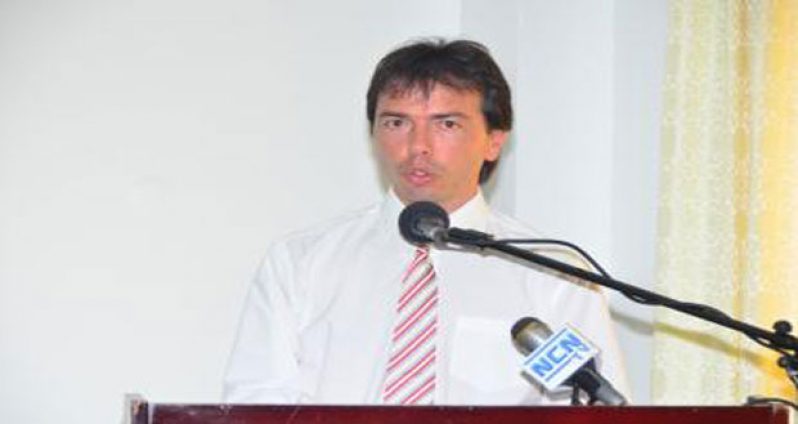A WORKSHOP was held on January 28, 2015 at the International Conference Centre, Liliendaal. The workshop was entitled ‘Rethinking the Millennium and Sustainable Development Goals’, where Professor Baris Karapinar presented the findings of a stakeholder survey conducted a few years ago. Professor Karapinar is Project Coordinator at Boğaziçi University, Istanbul and was previously affiliated with the University of Bern in Switzerland. The workshop was chaired by Dr. Prem Misir. Minister of Housing and Water Mr. Irfaan Ali also graced the workshop with his attendance as a member of the head table panel.
As part of an international research project, coordinated by the University of Bern in Switzerland, which aimed at investigating national policy priorities in five developing countries – namely Guyana, Malawi, Nepal, Sierra Leone and Turkey – Professor Karapinar conducted an attitude survey including a choice experiment. His findings shed light on how various policy stakeholders perceived developmental challenges, and how they identified their own priorities and goals.
These goals included both the United Nations’ Millennium Development Goals concerning education, HIV and AIDS and poverty and the Sustainable Development Goals on biodiversity, clean air and forest protection.
In this workshop, Professor Karapinar discussed how respondents from Guyana and other sample countries perceived developmental challenges and priorities. He also presented the findings of the econometric analysis of how the respondent’s “demand for development” is influenced by cost and income considerations.
Moreover, he showed how non-monetary factors such as the respondent’s professional affiliation, education and gender, are found to exhibit strong influences on certain development areas. His findings suggested that, despite the recent efforts to widen the scope of international development goals, it may be difficult to change local stakeholders’ development priorities. He further discussed the policy implications of the findings. One example is where Guyana and Nepal saw the SDGs as ‘necessary’, whereas other sample countries saw some SDGs as a ‘luxury’.
At the end of the workshop, Dr. Misir noted that the attitudinal survey was a cross-sectional study design which addressed attitude at one point in time, and indeed such attitudes may change over time.
Guyana, Malawi, Sierra Leone, and Nepal showed similar priorities on the following Millennium Development Goals (MDGs): poverty, fighting disease, and primary education. Guyana, Malawi, Sierra Leone, and Nepal also expressed similar priorities on the Sustainable Development Goals (SDGs): renewable energy, climate adaptation, and clean water. With the exception of Turkey who expressed priorities on the following MDGs: poverty, primary education, and gender equality and priorities on the SDGs: renewable energy, disaster preparedness, and soil protection.




.png)









